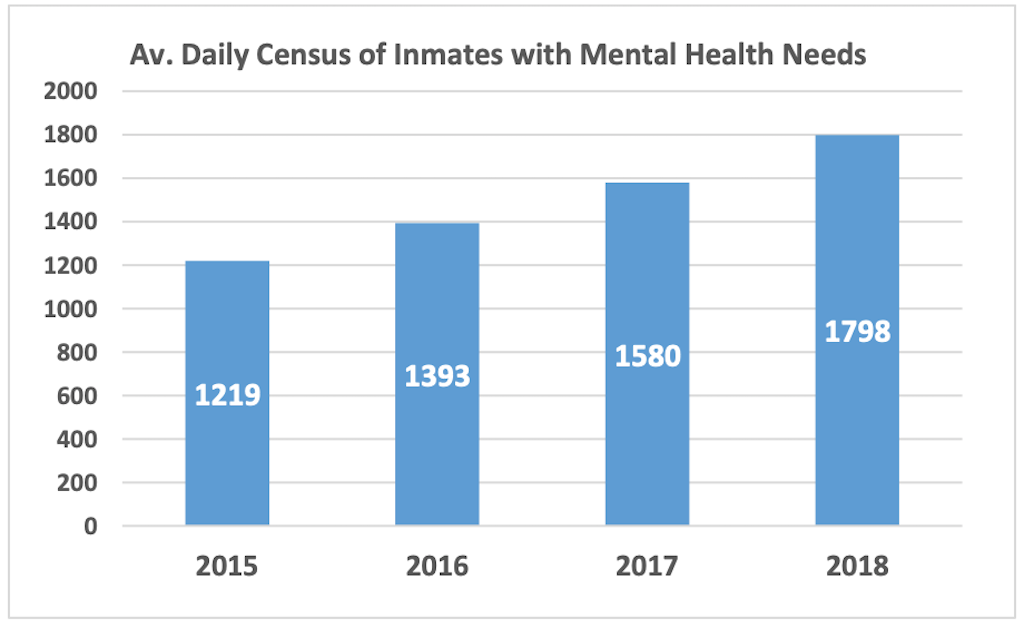Editor’s note: The Orange County Sheriff’s Department released the following news announcement today, Wednesday, March 27, 2019:
Orange County Sheriff-Coroner Don Barnes announced major changes to Orange County’s jail operations to efficiently use department resources and address the increasing need for inmates requiring mental health services.
“Since 2015, we have seen a 40 percent increase in open mental health cases in our jails,” said Sheriff Barnes. “The number of mental health cases now reach almost 1,800 on any given day. Consequently, we must focus on enhancing our mental health services and expanding the number of beds available for individuals with mental health needs.”
As seen in the chart below, the number of inmates requiring mental health treatment in jail settings continues to climb, along with the severity of the mental illnesses.
At present, approximately 30 percent of the jail population requires various levels of mental health services and that number has been increasing exponentially over the last five years. Mental health services include: counseling, medication management, intensive outpatient care, discharge planning, acute psychiatric inpatient care (hospitalization), and emergency psychiatric medications. OCSD has seen continuous increases in the number of inmates requiring mental health services from Correctional Health Services (CHS).
To address these increasing needs, OCSD will upgrade three existing housing modules at the Intake Release Center to treat inmates with mental health needs. ADA compliant cells and restrooms will be added. When complete, the upgrades will add approximately 500 behavioral health beds allowing for the security, care and treatment of male and female inmates. In order to accommodate the demand for mental health treatment and programming, increased staff will be added in mental health housing units. These upgrades and staffing will be more conducive to providing programs.
In addition to being a primary provider of mental health care, jails across the nation are also quickly becoming front-line providers for substance use disorders, particularly in responding to the opioid epidemic. In 2018, approximately 40 percent of the jail population reported some type of substance use, and more than 100 inmates required frequent monitoring and assessment for drug and/or alcohol detoxification on a daily basis. With the upgrades, we will have designated areas for both males and females to focus on detoxification and treatment, in addition to added services and programing specific to drug use.
The Intake Release Center booking operations triage area where inmates first come when they are brought to jail will be redesigned and remodeled with privacy partitions to provide greater confidentiality when screening inmates for medical and mental health issues.

In this file photo, inmates line up to get their food and sit down at the start of dinner in a dining room capable of feeding 292 inmates at the Theo Lacy Facility jail in the City of Orange.
File photo by Steven Georges
In order to fund and increase staffing ratios for inmates with mental health and substance use disorders, Sheriff Barnes has developed a jail operations reorganization plan.
“I have made the decision to make two significant changes to our jail operations,” said Sheriff Barnes. “These decisions are intended to mitigate the risk of litigation from the state while, at the same, minimize costs to Orange County taxpayers.
“Jail operations at the James A. Musick Facility will be temporarily suspended and our agreement with the Federal Government to house Immigration and Customs Enforcement (ICE) detainees will be ended.”
The Sheriff’s Department has leased bed space to ICE since 2010. The current agreement expires in July 2020 and allows for early termination. In order to address the mental health crisis within Orange County jails, OCSD has notified ICE of the intent to terminate the agreement. Once formally terminated, ICE has 120 days to transfer the detainees to other facilities. Unfortunately, based on statutory language within SB-54, those individuals housed on behalf of ICE will most likely be transferred outside of California, separating them from family members who reside within this state.
The conclusion of the ICE agreement will allow maximized use of jail bed space and focus on the needs of the mentally ill. The loss of revenue will be offset by the savings through the temporary closure of housing operations at the Musick Facility.
The Musick Facility will be reopened when the construction of two new state-funded housing facilities are completed. The 512-bed and 384-bed facilities are specifically designed to meet the growing needs of today’s inmate population. The estimated completion is fall of 2022.
The decision to end the ICE agreement will not impact public safety. OCSD will continue to work with ICE within the confines of SB-54 to ensure they are alerted to the release of serious and violent offenders within our custody who have ICE detainers.
Treating those with mental illness in our jails is only one portion of the larger challenge policymakers must address with regards to the influx of the mentally ill in our community.
“We are obligated to do everything we can to provide care for the inmates in our custody and connect them to services,” said Sheriff Barnes. “We have a shared interest in rehabilitating inmates with mental health challenges and substance use disorders to be stable and sober, with the ultimate goal of having them not return to jail.”
 Behind the Badge
Behind the Badge




